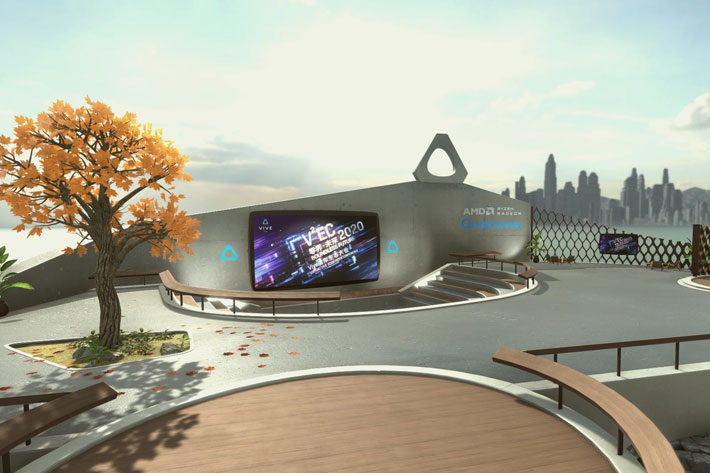
HTC suggested earlier in the month that their 2020 Vive Ecosystem Conference would be held online and in Virtual Reality. The event starts today and yes, it’s, if you’ve the gear, in 6DoF VR.
Registration for HTC’s 2020 Vive Ecosystem Conference started March 10, and the event is scheduled for today, March 18, starting at 5:30 pm Pacific. As so many industry events are being cancelled worldwide, the decision was easy for the organizers of the event: it would be online, streamed live to YouTube. But because this is a conference about Virtual Reality, Vive China President Alvin Wang Graylin confirmed on his Twitter feed that the company will “hold the world’s first fully #virtual industry #conference in #VR! 3/19 via #Engage.”
https://youtu.be/tYPZCek-1e0
Created by Immersive VR Education, the company behind virtual experiences such as Apollo 11 VR and Titanic VR, Engage is an advanced virtual reality education and training platform that makes it easy to collaborate and learn in VR. It enables educational institutes and businesses to host classes, conferences, private lessons and presentations with people from across the world in a safe & multi-user environment.
It’s like Second Life with a VR headset
Introducing the Vive event, which is the 4th annual Vive Ecosystem Conference, and “one of the most prominent events in the XR industry”, according to HTC, the company said that “due to the COVID19 outbreak, we will be hosting the entire conference in VR, and enabling for the first time a physical conference replaced by a virtual one.” Named, now, Virtual Vive Ecosystem Conference (V²EC) the event has a theme and aim: “Boundless Future”.
For younger people this might sound like a revolutionary experience, but when you’re older, like me, the images shared by HTC of their virtual meetings while planning the V²EC 2020 look very much like my adventures in Second Life, an online virtual world developed by Linden Lab in 2003. In fact, my printed book about Virtual Worlds, published in 2008, a guide for those who wanted to understand the universe of virtual worlds, Second Life included, was launched during a virtual conference at the University of Porto, in Portugal.
TV series from a virtual world
From William Gibson launching his book Spook Country in Second Life to HBO paying a six-figure sum for the rights to a seven episode mini-series documentary created in Second Life or the quietness of the virtual library space of Bantam Books – where I spent many hours reading through books – everything in Second Life seems, today, as an early sign of what was to come. Sony, Microsoft, NASA, and many other companies or organizations had their virtual space there, which was used in many cases for virtual meetings. Some still have, although Second Life’s heydays are gone.
One good example of a virtual event held regularly in Second Life, back then (starting 2006), took place at the Philips Design space. Philips decided to enter the imaginary, on-line community “to gain feedback on innovation concepts, engage residents in co-creation and obtain a deeper understanding of potential opportunities in this virtual environment”.
The Philips Design experience
In the Philips Design space on Second Life a group of people from around the world would meet regularly to share their opinions about new products being developed. Virtual concepts were tested and users could have, according to Philips, “a greater say in the kind of colors, ergonomics, functionality and other features of products they may wish to buy in this virtual world.”
The company believed that the experience allowed Philips Design to find new ways of relating to end users. According to Philips’ press release “having such direct feedback can significantly enrich the design process and lead to innovative and surprising end results. This fits with the Philips Design philosophy that design should be based around people and grounded in research. It also corresponds to Philips Design’s firm belief that the future of design lies in the co-creation of products.”
Participants, which were Second Life residents from around the world, in order for Philips to get a variety of opinions, would meet regularly to be presented new concepts, discuss them and afterwards fill an online survey. We were paid in Amazon vouchers. Looking at the images published by HTC to show its planning sessions of the conference, I feel that not much has changed, only now a headset is used to make the idea of a virtual world more immersing.
